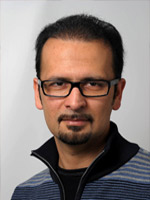In this column, I ask neuroscience professors from around the world the same five questions. Read on to learn more about their research, careers and goals for neuroscience in the future.

Interview with Mahmood Reza Amiry-Moghaddam
Professor in Medicine and Head of the Laboratory of Molecular Neuroscience at the University of Oslo.
Group leader, Laboratory for Molecular Neuroscience
Research Director, Section for Biology and Medicine, Oxysolutions
Leader and spokesperson for the non-governmental organization “Iran Human Rights”
1. What inspired you to pursue neuroscience as a career?
Well, as a student I didn’t have being a neuroscientist as my goal. I started doing science in a neuroscience lab at the University of Oslo, besides my studies when I was a third year medical student in 1991. My first project was to look at the role of taurine in kidney tubule cells. While I was presenting my first poster at the International Congress in nephrology (Jerusalem), I saw another poster on the first water channel expressed in the same tubule cells as taurine was according to my results. Then I got interested in water channels, and later when the first water channel was identified in the brain our group (which had neuroscience as its main topic) started working on water channels in the brain. After finishing my medical studies and internship, I started doing PhD on the role of aquaporin-4 (AQP4) water channel in the brain. That’s how I became familiar with the brain, and especially how little we know about the brain and how fascinating organ it is.
2. What do you think is the most important goal of neuroscience research?
Compared to the other organs in the body, we still know very little about the brain. Besides, there are very few treatments for the diseases that affect the brain, both neurological and psychiatric diseases. Most of the current treatments are symptomatic and none of them aims at curing the disease. I think the reason is that we still know too little about how the brain works and eeven less about the molecular mechanisms behind brain diseases. On the other hand we see that with an increasingly ageing population, more and more people will suffer from brain diseases. Diseases such as Parkinson’s and Alzheimer’s disease are becoming even more common than before. And we still don’t know how these diseases start, why they start and how can we stop them. So I think the most important goal of neuroscience research is to identify the mechanisms behind the diseases which affect the brain. To do that we need to learn more about how the brain works, both at cellular and organ level. Fortunately, we have more tools to explore the brain now than we had just 15 years ago.
3. What are the main topics and goals of your research?
I am still trying to find out what the function of Aquaporin-4 (AQP4) water channels in the brain are. AQP4 is one of the most abundant proteins in the human brain and we still do not know what its physiological functions are. But we are getting there. My research is also focused on the role of astrocytes in the brain. Astrocytes are one of the most abundant cells in the human brain but have not received the attention they deserve in the neuroscience research. Most of the focus have naturally been on the neurons. I think astrocytes and the other glial cells play a much more important role in normal brain function as well as in the development of brain diseases than what we have thought previously. Concerning diseases, I am working on several projects addressing how neurodegenerative diseases such as Parkinson’s disease develop. So Parkinson’s disease and especially the role of astrocytes in this disease are important topics of my research.
4. What accomplishment do you think is the most important out of your own research?
So far, I think my research has contributed in elucidating the role of AQP4 water channels in formation of brain oedema. Brain, like other organs swells upon injury. But brain swelling is fatal as the brain is encaged in a rigid skull with little space to swell. We have found that AQP4 water channels are a major route for water to enter the brain during brain oedema formation. This will hopefully lead to development of new drugs to stop formation of brain oedema.
5. What do you hope to accomplish in the next 10 years in the field of neuroscience?
I hope to contribute significantly to elucidate the role of astrocytes in development of neurodegenerative disorders such as Parkinson’s disease. And of course, to find out why brain has so much of the water channels protein AQP4.
Bonus question: What is your advice to a teenager who wants to learn more about neuroscience?
I think science in general and neuroscience in particular is fascinating. Anyone who gets the opportunity to do neuroscience is extremely privileged. Through science, we can make the world a better place. So my advice would be to be to read, be curious and ask questions. With today’s technology, you can reach out to anyone you like.
